Amazon Has an Even Bigger Share of the eBook Market Than We Thought – Author Earnings Report
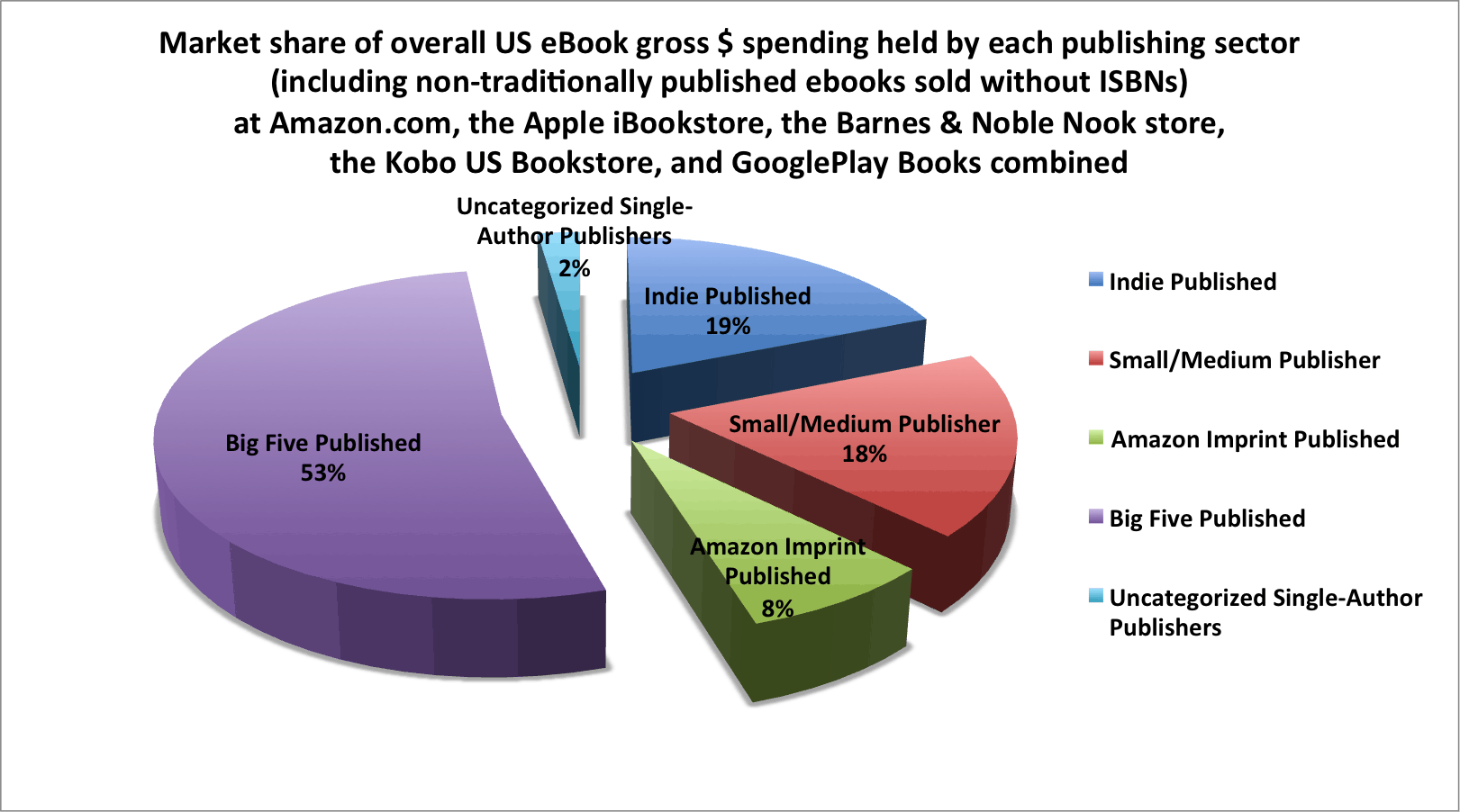
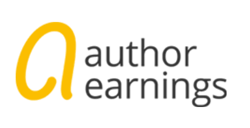
For your Friday reading pleasure, the latest edition of the Author Earnings Report explores which retailers control how much of the US ebook market.
Where past reports focused solely on the Kindle Store (or offered a similar single-store snapshot of a competing store), the October report offers a cross-sectional view of the US ebook market.
It’s the first new look at the market that I have seen in (I think) over a year, and it does not paint a heart-warming picture for those who hate Amazon. The report finds that Amazon can lay claim to 74% of the units sold in the US ebook market, and 71% of the dollars spent.
Something like 99% of consumer ebook sales are made through just five major ebook retailers. Amazon accounts for the majority of those sales, with iBooks coming in second with about 10% to 12% of sales.
Barnes & Noble has somehow managed to hold on to third place, with roughly 7% to 8%, followed by Kobo with 3% to 4% of sales. And rounding out the top five is Google Play Books, with 1% to 2% of the US ebook market.
The report goes on to analyze the smaller ebookstores in terms of units sold and revenue earned. The estimates are generated based on the same methods used for the Kindle Store (the best seller lists) and they lead to some surprising conclusions.
For example, Apple’s ebookstore is dominated by the Big Five. iBooks leans heavily towards the B5 both in terms of units sold and dollars spent. Indies make up 23% of units sold, but only 9% of revenue. The Big Five, on the other hand, account for 58% of units sold and 74% of revenue.
With 54% of units sold and 69% of dollars spent going to the Big Five, the Nook Store was almost as bad as iBooks.
Kobo (not shown here) displayed a similar prevalence for Big Five sales, but Google Play did not.
The report concludes with a look at the overall ebook market, which still leans heavily towards the Big Five. You can find that data, as well as an analysis of the Kindle Store, over on the Author Earnings Report website.
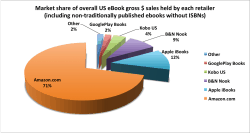
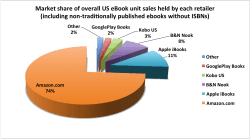
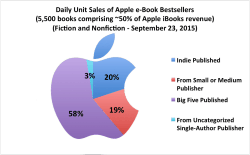
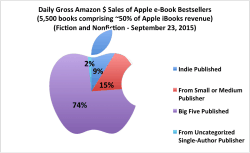
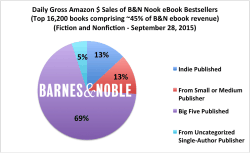
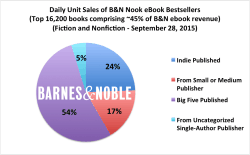
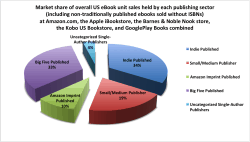



Comments
fjtorres October 9, 2015 um 8:35 pm
The report uncovered a few interesting facts:
– GOOGLE manipulates their overall top 100 "sellers" listing but not the genre-specific lists.
– the Nook website is so "fragile" Data Guy had to rework the spider to get it to crawl successfully.
– Kobo’s market share has apparently dropped by half since Rakuten bought it back in late 2011. This despite inheriting the Sony customer base and a good chunk of Nook defectors.
– Interoperable epub stores combined add up to less than 8%. So much for Adept being an "industry standard".
– For some reason, Indie authors going into iBooks through aggregators (Smashwords, D2D) seem to sell significantly less than Indies going direct from Macs.
Nate Hoffelder October 9, 2015 um 10:55 pm
@FJTorres
Yes, the detail about Google Play books was weird. But where did you pick up the fact that Kobo’s share had shrunk?
Smart Debut Author October 9, 2015 um 9:28 pm
I suppose publishers who keep 75% of their authors' digital royalties might read those graphs that way.
But authors netting 17.5% on digital sure as hell don’t.
To those authors, that big, fat blue slice o' indie author earnings, and the big, fat blue slice o' all books purchased by digital readers tells a very different story about which way the market is "leaning"… 😉
And to readers, who are buying just as many indie ebooks as big five ones, the answer’s pretty much a toss-up.
Guess it all depends on one’s perspective. 🙂
fjtorres October 9, 2015 um 11:25 pm
In 2011 when Rakuten bought them Kobo bragged that they had a "high single digit" market share which translates to 8-9%.
If they are currently running 4% after absorbing Sony and a chunk of Nook customers it is easy to see why Rakuten brought in their turnaround specialist.
Nate Hoffelder October 9, 2015 um 11:29 pm
Yeah, that was nonsense.
fjtorres October 10, 2015 um 12:03 am
Could be.
But your source had Apple at 10% and that was pretty doubtful at the time.
The Kobo brag may or not have been true but that is what Rakuten paid for. One would assume they did due diligence…
Regardless, there definitely is a lot less to Kobo than their fans believe.
Nate Hoffelder October 10, 2015 um 7:13 am
@ Felix
The Apple guesstimate was far more plausible than believing Kobo had 8%. For one thing, my source didn’t work for Kobo, and thus wasn’t puffing up his company. And for another, no one was talking about Kobo at that time.
Thomas October 10, 2015 um 3:40 am
Kinda sucks cause I really dig Kobo’s approach.
fjtorres October 10, 2015 um 10:31 am
@Thomas: the main problem with Kobo’s approach is that it relies on other people doing the hard work on the ground. It works in small markets or regions where the local partner is strong and committed (like Indigo) but in the US they have no significant partner and even Rakuten gives them the cold shoulder on their US website.
The first step in any commercial operation is consumer awareness and mindshare and among mainstream buyers Kobo is hardly a name to conjure by. As evidenced by the numbers.
And now, to add insult to injury, the suppliers of their biggest revenue stream (BPH titles) are actively trying to discourage sales of their ebooks in favor of print books. Now, what message does that send to Kobo’s independent bookstore partners?
They’re either going to have to get actively involved in marketing their products or resign themselves to the same tier as Onyx and other specialty ereader vendors.
Anne October 10, 2015 um 1:22 pm
@Thomas- What in particular do you like about Kobo’s approach? Are you looking at it from the viewpoint of a reader and/or author?
Maria (BearMountainBooks) October 10, 2015 um 1:55 pm
From a reader standpoint, I like kobo because they offer coupons. Sure, they mostly work on indie and small publisher books, but that is what I buy. I get the big guys from the library or used and lately it’s been library or I don’t read them.
From a writer perspective I like Kobo because they HAVE a few programs for advertising, their upload process is easy, their CS for writers is very responsive and I never feel that books are sorted to give an advantage to BHPs (They may be and they may be on every channel, but it doesn’t seem there is an issue).
I agree that ANY site (including Kobo and Apple) may have less visibility when the books are not uploaded directly. I used to think B&N actually gave more visibility to Smash titles than direct, but that was just falling sales in general. I’ve played around with both types of uploads. I’ve thought for a long time that I need to direct load to Apple because I’m missing out, but I don’t own an Apple product and I don’t want to go third party as I am not sure I’d get all the benefits. I also get very, very tired of having to deal with CS via third parties. There is always a delay and some are better than others, etc.
There are a lot of apple devices out there and they are made to shop at apple. Apple, like Amazon, wants to keep everyone "in the ecosystem" so that is probably where I would have the most potential for growth if I ever bought an Apple product.
Anne October 10, 2015 um 6:31 pm
@Maria- Thank you for your viewpoints. Receiving a coupon this morning is what triggered my question. The coupons are the only reason I can think of to go back Kobo as a reader, maybe the new loyalty program counts as well but it’s not enough for me right now. I left them when they filed their objection to the settlement Canada’s Competition Bureau made with price fixers and I haven’t been back.
What you say about them from the writer perspective aligns closely with the experience of the author in the family.
Maria (BearMountainBooks) October 10, 2015 um 7:14 pm
I’ve heard you can use those coupons against the 10 dollar loyalty membership (I have not tried it myself, but someone said they used it and then got the membership for half and a free book). I’m not interested in any kind of memberships. I don’t even like the grocery store one that I have to use just to get decent prices at one of the stores near me. If I shopped on Kobo enough, the loyalty thing might be of interest, but I shop wherever is cheapest. Too many indies are only on Kindle, but the good news is that if there is a book I’m interested in, it’s got a good chance of showing up free or 99 cents eventually.
Thomas October 11, 2015 um 6:31 pm
Purely as a reader I prefer their reading app. And I like the new loyalty program, especially with agency in place as it means that if I’m going to get my book anywhere it might as well be where I get something in return. And if the book isn’t agency I get a bigger discount! Hmm, does Amazon undercut the extra 10%?
Can I use this moment to ask commenters what they see the end game as? All authors become self-published? All jobs in a publishing house become freelance? If you price your book above 0.99 you don’t deserve to be called an author? Just curious what the solution is rather than complaining about the status quo.
Peter C. October 13, 2015 um 3:53 pm
I had an idea that Amazon is on top but thanks for sharing the exact stats of how much these companies weigh in US eBook market. I am quite surprised to see the small market share of Nook and Kobo. Hope that they can do better. Market dominated by one giant is not healthy and bad for consumer.
Ingen högsta domstol för Apple och e-böckerna | Daniel Åberg – Författande, bokbransch, teknik och småbarnsliv March 9, 2016 um 1:31 am
[…] som under tiden då Apples avtal med bokförlagen var i bruk sjönk till cirka 60 procent. Enligt de senaste tillgängliga siffrorna jag sett har nu Amazons andel stigit uppåt 75 procent av marknaden, med Apples iBookstore som […]
?? Kindle ????????????????-??? April 26, 2016 um 3:18 am
[…] Kindle ????????????????2007 ?????????????????????????????? 70% ?????? […]
34 Monopolistic Competition Examples from Around the World July 7, 2016 um 7:00 am
[…] it comes to electronic readers, the Amazon Kindle is a powerhouse, claiming 74% of the eBook market in […]
How Amazon innovates in ways that Google and Apple can't | BLABLA.id NEWS December 28, 2016 um 2:57 pm
[…] of Amazon pioneering a new product category and then going on to dominate it. Amazon has become the leader in the e-book market on the strength of its Kindle line of e-readers. And it dominates an important segment of the cloud […]
How Amazon innovates in ways that Google and Apple can’t – The Antidolt December 28, 2016 um 3:15 pm
[…] of Amazon pioneering a new product category and then going on to dominate it. Amazon has become the leader in the e-book market on the strength of its Kindle line of e-readers. And it dominates an important segment of the cloud […]
How Amazon innovates in ways that Google and Apple can't – Vox | Vmmersive January 4, 2017 um 4:03 am
[…] of Amazon pioneering a new product category and then going on to dominate it. Amazon has become the leader in the e-book market on the strength of its Kindle line of e-readers. And it dominates an important segment of the cloud […]
Google and Apple can’t Innovate in ways Amazon can. Ever wonder why? January 24, 2017 um 10:41 am
[…] of Amazon pioneering a new product category and then going on to dominate it. Amazon has become the leader in the e-book market on the strength of its Kindle line of e-readers. And it dominates an important segment of the cloud […]
How Amazon innovates in ways that Google and Apple can’t – VietnamMarcom Asia February 15, 2017 um 3:56 am
[…] of Amazon pioneering a new product category and then going on to dominate it. Amazon has become the leader in the e-book market on the strength of its Kindle line of e-readers. And it dominates an important segment of the cloud […]
Why Innovation Platforms Threaten Your Company — and You – Bernard Golden June 29, 2017 um 8:05 pm
[…] One can look at a range of markets and see the same results. In video hosting, YouTube is massively larger than any other provider. In e-book platforms Kindle is dominant. […]
Nullam Eget Elit Ante – Happy Creations October 22, 2017 um 4:00 pm
[…] loads of successful innovations under its belt (e.g., Alexa, eBooks, Amazon Drive) and many still in the works (e.g., Amazon Go), Amazon has figured out the secret […]
Next Year You Will Need To Experiment Like A Startup | Speakers Associates January 4, 2019 um 6:28 am
[…] loads of successful innovations under its belt (e.g., Alexa, eBooks, Amazon Drive) and many still in the works (e.g., Amazon Go), Amazon has figured out the secret to […]